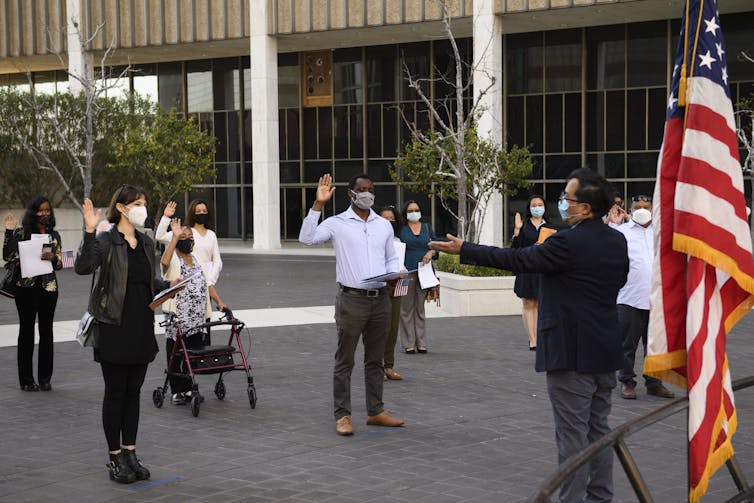When Americans recall their roots, they open up to immigration
Research suggests that reminding Americans – Democrats and Republicans – of their family history creates empathy for immigrants and more favorable views toward immigration.

Which was the first generation in your family to arrive in America? Do you know why your family came to the United States?
Members of President Joe Biden’s administration – and key nominees – have answered these questions in their first days in office.
Upon his nomination as Biden’s secretary of Homeland Security, Alejandro Mayorkas, a native of Cuba, tweeted: “When I was very young, the United States provided my family and me a place of refuge.”
Secretary of State Antony Blinken, Vice President Kamala Harris, Attorney General Merrick Garland and Xavier Becerra, nominee for Health and Human Services secretary, have conveyed similar messages about their immigrant roots.
Meanwhile, the Biden administration has moved quickly to relax immigration restrictions, issuing executive orders to halt or reevaluate many of former President Donald Trump’s policies.
And Congress will soon consider the administration’s expansive immigration reform bill. Polls suggest 60% of Americans support some of its policies, such as a path to citizenship for immigrants in the country illegally.
But the legislation faces strong opposition from Republican lawmakers.
Our research suggests that reminding Americans of where they came from – such as the statements by Biden administration officials – creates empathy for immigrants, generating more favorable attitudes toward immigration.
A history of migration – and xenophobia
Migration is a key component of the American story. Successive waves of migrants have reshaped the U.S. socially and politically from the 16th century to the present.
Yet this history of migration has coexisted with xenophobia: a form of prejudice against people from other countries. This prejudice has fluctuated over time, sometimes acquiring significant political influence.
U.S. immigration policies have often been highly restrictive as a result, particularly for nonwhite and non-Christian peoples. The 1882 Chinese Exclusion Act and the immigration quotas of the early 1920s are just two instances.
Trump is the latest example of a political leader leveraging anti-immigrant attitudes to seek votes and limit migration into the country.
While Americans have become more supportive of immigration since the 1990s, including during Trump’s presidency, public opinion toward immigration has also polarized along partisan lines.

Using family histories to advocate for immigrants
Biden administration officials are not the first political leaders to reference family migration histories when talking about immigration.
The narrative of America as a “melting pot” has a long history.
Educators have used radio programs, school curricula and history textbooks to draw explicit links between America’s migration history and contemporary immigration issues.
Some curricula use structured exercises to have students reflect on how their own families’ migration experiences relate to immigration issues.
Our own research shows that this narrative can shift U.S. public opinion to become more favorable toward immigrants.
Across three surveys conducted in 2018 and 2019, we asked 6,000 respondents to remember their family migration histories. We also asked them about their views on immigration.
Respondents – including both Democrats and Republicans – who were randomly assigned to think about their family history before telling us their immigration preferences expressed more favorable feelings toward immigrants.
They also showed a preference for more open immigration policies than respondents who were not asked to think about their family history first.
Our results suggest that thinking about family history had this effect because it creates more empathy for contemporary immigrants.
Empathy and attitudes toward migration
Our findings indicate that immigration advocates are pursuing an effective strategy when they remind Americans of their migrant heritage.
When the George W. Bush Presidential Center emphasizes that the U.S. is “A Nation Built By Immigrants,” or the Carnegie Corp. asserts that “America’s Story” is “An Immigrant Story,” Americans who hear these messages tend to reflect on their own connections to immigration. It also spurs them to empathize more with today’s immigrants.
Our research may also help explain why Americans are more supportive of immigration than citizens of many other countries, where immigration typically plays a smaller role in their self-perceptions.
Negativity toward migrants, stoked by factually inaccurate threat narratives – that migrants steal jobs and overrun schools and hospitals – is the norm in many countries. But reminding people what they share with immigrants can help build support for more inclusive policies.
The authors do not work for, consult, own shares in or receive funding from any company or organization that would benefit from this article, and have disclosed no relevant affiliations beyond their academic appointment.
Read These Next
In World War II’s dog-eat-dog struggle for resources, a Greenland mine launched a new world order
Strategic resources have been central to the American-led global system for decades, as a historian…
Revisiting the story of Clementine Barnabet, a Black woman blamed for serial murders in the Jim Crow
In 1912, a young Black woman’s supposed religious beliefs were quickly blamed to make sense of a terrifying…
New dietary guidelines prioritize ‘real food’ – but low-income pregnant women can’t easily obtain it
New research reveals a deepening crisis in prenatal health as geography and income increasingly dictate…





